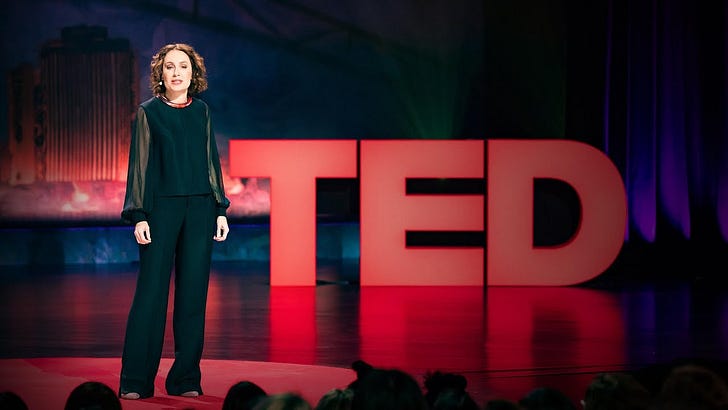Resource: 'Dr. Lucy Hone's TED Talk 'The Three Secrets of Resilient People.'
A powerful video that strikes a chord.
Hello, Dear Reader! Welcome to our new Carer Mentor community members!
I’m Victoria. You can read why I’m publishing Carer Mentor here: Who Started Carer Mentor and Why?
This was a video I’ve carried with me along my journey because it’s inspirational.
A TEDTalk to share: Dr Lucy Hone is a resilience expert who thought she found her calling supporting people to recover following the Christchurch earthquake. She had no idea that her personal journey was about to take her to a far darker place. In this powerful and courageous talk, she shares the three strategies that got her through an unimaginable tragedy—and offers a profound insight into human suffering.
Lucy Hone | TEDxChristchurch
September 25, 2019.
Dr Lucy Hone is a director of the New Zealand Institute of Wellbeing & Resilience, a research associate at AUT University, and a published academic researcher, best-selling author and contributor to Psychology Today, the Sunday Star Times and Next magazine.
She trained at the University of Pennsylvania and got her PhD in public health at AUT University in Auckland. She has helped various organisations—from primary schools to leading law firms—design and implement well-being initiatives creating sustained and meaningful change. Five years ago, the sudden death of Lucy’s 12-year-old daughter Abi forced Lucy to turn her academic training and professional practice to foster resilience in very personal circumstances. The blog she wrote in the aftermath of Abi’s death attracted international attention and resulted in the best-selling non-fiction title, What Abi Taught Us, Strategies for Resilient Grieving (Allen & Unwin, 2016), now available as Resilient Grieving in the US, UK and NZ. This talk was given at a TEDx event using the TED conference format but independently organized by a local community.
The 3 strategies:
Lucy Hone articulates three strategies we can employ in our daily lives.
At 7 minutes 8 seconds: Resilient people get that shit happens. They know suffering is a part of life, the human experience, and there is less focus on self-victimising ‘Why me’. Focus on ‘Why not me’. i.e. I’m not alone in feeling this way, I haven’t been singled out.
At 8 minutes 16 seconds:
Resilient people are very good at where they focus their intentions. They realistically appraise and focus on things they can change and accept what they can’t. Whilst our ancestors were hard-wired to focus on the negatives for survival, we are bombarded by negatives in these modern times.
Resilient people don’t dial out the negatives; they dial MORE into the positives, choosing to zone into the positives. Benefit-finding. Resilient people count their blessings and actively seek things to be grateful for. In this day and age, we may need more reminders, language, and intent to give ourselves ‘permission’ to do this.
Find the right language and intentionally, deliberately, and consistently with ongoing effect, identify the positives.
At 12 minutes 22 seconds, ask yourself, “Is what I’m doing helping or harming me?” Consciously ask the question and Be Kind to yourself. This will give you back control and probably give you a reason to put down that bottle of wine so that you can get some deeper sleep (even if it is short!).
Despite all the challenges, painful moments, and bittersweet moments in our caregiving journey, we’ve had some incredibly high-quality, meaningful moments that we’ve shared in our love bubble, for which I’m so grateful. These are other small blessings or moments were enough to keep me going.
Please ‘❤️’ LIKE the article & share it if you think this could help others.
Carer Mentor by Victoria is free to read. If you have the means and would like to support the publication, I welcome monthly (£6) and annual (£50) subscriptions. Thank you for your ongoing support.
Dr. Susan David's TedTalk: 'The Gift and Power of Emotional Agility.'
Susan David’s TED Talk and book, ‘Emotional Agility: Get Unstuck, Embrace Change, and Thrive in Work and Life’, offer a fresh mindset and approach that empowers us. Susan David and Christina Congleton published their article ‘Emotional Agility’ in the Harvard Business Review (HBR) in November 2013
An Interview: Dr. Susan David 'Emotional Agility'
Emotional agility is the ability to healthily engage with our thoughts, emotions, and stories to lead a life congruent with our values. It involves four steps: showing up, stepping out, walking your why, and moving on.
Embracing the discomfort of negative emotions is crucial, as they are often ‘signposts’ of what we care about. Emotional agility is a critical skill set in navigating life's challenges and changes.








I was not familiar with Lucy Hone. Thank you for bringing her story forth.